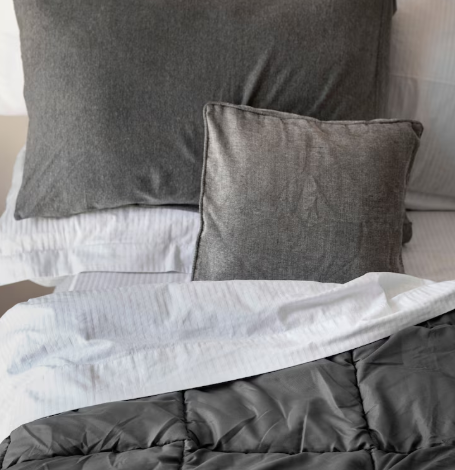Egyptian Cotton at 1000 Thread Count: Quality, Comfort, and Durability Explained

You know that feeling when you check into a nice hotel and the sheets just feel… different? Like they’re somehow softer and more comfortable than anything you have at home? That’s probably Egyptian cotton you’re experiencing, and there’s a good reason why it feels so much better.
Most people sleep on whatever sheets they grabbed at the store without thinking much about it. But if you’re tired of waking up with scratchy, uncomfortable bedding that leaves you tossing and turning all night, 1000 thread count sheets of Egyptian cotton might be precisely what you need. Though honestly, the whole thread count thing is more complicated than most people realize.
Why Egyptian Cotton Actually Matters
Egyptian cotton isn’t just marketing hype. The stuff really is different from regular cotton, and it comes down to where it grows. The Nile River Valley has this specific climate that creates cotton fibers that are longer and stronger than what you get from other places.
These longer fibers – they call them “extra-long staple” – are about 1.5 to 2 inches long. Compare that to regular cotton at around 1 inch. Doesn’t sound like much, but that extra length makes a huge difference in how the final fabric feels and lasts.
When you spin longer fibers into yarn, you get smoother threads with fewer weak spots. That means your sheets stay soft longer and don’t fall apart as quickly. It also means manufacturers can pack more threads into each square inch without making the fabric feel stiff or heavy.
Regular cotton gets rough when you try to make it into high-thread-count fabrics. The shorter fibers need more twisting and processing, which makes everything feel scratchy. Egyptian cotton stays smooth even when woven tightly.
The Thread Count Reality Check
Here’s where things get tricky. Thread count is just how many threads fit in one square inch of fabric. Sounds simple, right? But companies have figured out ways to game this number that don’t actually make better sheets.
Some manufacturers twist multiple thin threads together and count each one separately. So they might claim 1000 thread count, but it’s really 500 threads that are twisted in pairs. These sheets often feel heavy and don’t breathe well. You end up hot and sweaty all night.
Real 1000 thread count Egyptian cotton uses single threads – no twisting tricks. The weaving creates a dense fabric that’s still breathable. Your body temperature stays comfortable instead of fluctuating between too hot and too cold.
The higher thread count also means more fabric surface touching your skin. It creates this smooth, almost silky feeling that’s hard to describe until you experience it. Some people say it’s like sleeping on a cloud, which sounds cheesy but isn’t wrong.
See also: Why Every Homeowner Should Work with a Fencing Contractor
Temperature Control That Actually Works
One thing that worries people about high thread count sheets is overheating. And honestly, that’s a valid concern with cheap, high-thread-count sheets. They trap heat and moisture, making sleep miserable.
Egyptian cotton behaves differently, though. The natural properties of those long fibers allow air to move through the fabric. Even at 1000 thread count, good Egyptian cotton sheets breathe better than many lower thread count options made from inferior cotton.
Your body temperature changes throughout the night – that’s normal. When sheets trap heat, you wake up sweaty and uncomfortable. When they’re too breathable, you get cold and pile on blankets, then overheat again. Egyptian cotton at 1000 thread count finds a sweet spot.
The fabric seems to adjust to your body temperature. In summer, it helps you stay cool. In winter, it provides warmth without that stuffy feeling. This natural temperature regulation enables you to sleep deeper and wake up actually refreshed.
The Investment Question
Let’s be honest – quality Egyptian cotton sheets at 1000 thread count cost serious money. The sticker shock is real. But here’s the thing: if you calculate the cost per year, they often make financial sense.
Good Egyptian cotton sheets can last 10-15 years or even longer with proper care. The long fibers resist pilling and breaking. Each wash actually makes them softer, not rougher. After months of use, they maintain that smooth texture.
Compare that to cheap sheets that start pilling after a few washes and need replacement every year or two. The math begins looking different when you factor in longevity.
Proper care extends the life even more. Cool water washing with gentle detergent preserves the fibers. Skip fabric softeners – they can build up and make cotton feel stiff. Line drying or low heat in the dryer prevents damage.
The color retention is also better with quality Egyptian cotton. Those long fibers hold dye better, so your sheets keep their appearance wash after wash. No fading that makes your bedroom look worn out.
What It Actually Feels Like
The tactile experience of sleeping on 1000 thread count Egyptian cotton is different from regular bedding. That first night feels like staying in a luxury hotel, but the comfort continues night after night.
The smooth surface reduces friction against your skin and hair. Some people notice their hair looks better in the morning because the smooth cotton doesn’t create tangles. If you have sensitive skin, the reduced irritation from sleeping on rougher fabrics is noticeable.
The weight of 1000 thread count sheets provides a subtle cocooning effect without feeling heavy. The fabric drapes naturally over your body, creating comfort that helps you relax and fall asleep faster.
Wrinkles become less of an issue, too. The fabric naturally resists creasing, so your bed looks neat without constant ironing. This saves time and keeps your bedroom looking polished with minimal effort.
Thread Count Marketing Tricks
The bedding industry has created confusion around thread count through misleading marketing. Some companies claim thread counts of 1500 or even 2000, but these numbers often result from counting twisted threads as multiple threads.
True 1000 thread count Egyptian cotton uses single-ply yarns, not twisted multi-ply threads. The weaving process matters as much as the thread count. A well-made 800 thread count Egyptian cotton sheet often outperforms a poorly made 1200 thread count sheet using inferior cotton.
Price doesn’t always indicate quality either. Some expensive sheets use marketing rather than superior materials to justify high prices. Learning to identify genuine Egyptian cotton helps you make better purchasing decisions.
Percale and sateen weaves create different feels even with identical thread counts. Percale feels crisp and cool, while sateen feels smooth and slightly warmer. Personal preference determines which weave works best for your sleep needs.
Making the Right Choice
Choosing 1000-thread-count Egyptian cotton sheets requires research. Look for certifications that verify the cotton’s origin and quality. Reputable manufacturers provide detailed information about their cotton sources and manufacturing processes.
Consider your climate and personal temperature preferences. If you sleep hot, even the best high thread count sheets might feel too warm. If you sleep cold, the insulating properties might provide perfect comfort.
Your washing habits matter too. High-quality sheets require proper care to maintain their benefits. If you prefer low-maintenance bedding, you might consider other options. Egyptian cotton rewards adequate care with years of comfortable sleep.
The investment in quality bedding pays dividends in better sleep quality. Poor sleep affects every aspect of your life, from work performance to relationships. Spending money on sheets that help you sleep better often proves more valuable than many other purchases.
Quality sheets last for years, making the cost per night surprisingly reasonable when you calculate the long-term value. The difference between sleeping on cheap sheets and premium Egyptian cotton becomes evident from the first night. Your body deserves the comfort and support that comes from quality bedding.




